★★★
“Son of a witch…”
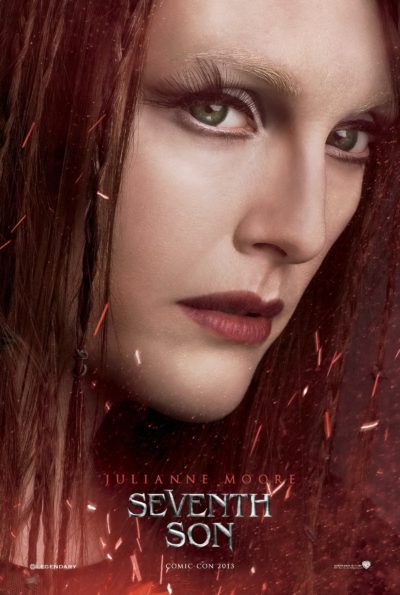 Despite generally terrible reviews, this is definitely not, by any means, a terrible movie. It is, admittedly, a fairly generic sword-and-sorcery flick, in which a hero must rise from a common background to save the world from a terrible magical threat. But it looks spiffy – the hundred million dollar budget is on the screen. If the central performance has its issues, there’s enough around the fringes to make both for an adequately entertaining experience, and also merit the existence of a review here. In particular, the main antagonist is the evil witch Mother Malkin (Moore). She escapes from the prison to which she had been confined years ago by Gregory (Bridges), now the last survivor of his order of witch-hunters.
Despite generally terrible reviews, this is definitely not, by any means, a terrible movie. It is, admittedly, a fairly generic sword-and-sorcery flick, in which a hero must rise from a common background to save the world from a terrible magical threat. But it looks spiffy – the hundred million dollar budget is on the screen. If the central performance has its issues, there’s enough around the fringes to make both for an adequately entertaining experience, and also merit the existence of a review here. In particular, the main antagonist is the evil witch Mother Malkin (Moore). She escapes from the prison to which she had been confined years ago by Gregory (Bridges), now the last survivor of his order of witch-hunters.
Malkin seeks revenge, but only succeeds in killing Gregory’s apprentice, Jon Snow [okay, it’s just Kit Harrington, but this works well enough as a Game of Thrones side-quest]. With just a few days before Malkin’s powers are fully unlocked, he needs a replacement, stat. That is pig farmer’s son, Tom Ward (Barnes), whose lineage provides him with the necessary talents to help fight Mother Malkin. Maybe… Things are, naturally, complicated on the fringes, by Tom’s growing relationship with half-witch Alice (Vikander), for she is also Malkin’s niece, and if uncertain loyalties. On the other hand, Tom owns the Umbran Stone, which his mother – at the time an acolyte of Mother Malkin – had stolen from her mistress, and which multiplies the abilities of any witch who possesses it.
In other words, a smorgasbord of Young Adult fantasy tropes, and there are a few plot-holes, e.g. why doesn’t Malkin just hole up for a few days to acquire her full powers? However, the execution of things here has some positives, in particular the energetic commitment of both Moore and Bridges [It’s a Big Lebowski reunion: I leave it to you to write your own joke there]. The former delivers a no-holds barred approach, getting good support from Antje Traue as Malkin’s sister, Bony Lizzie. The witches depicted here are certainly independent, strong women. They’re just not very nice. Meanwhile, Gregory has a clear zero-tolerance policy for witches, something which brings him into conflict with Tom, and Bridges’s mumbling feels a bit reminiscent of his performance in True Grit. Once you get used to that, it’s a far bit of fun to watch.
I think Bodrov’s lack of Hollywood experience may have been the main issue. While Bridges and Moore are experienced enough not to need much direction, the same isn’t true of Barnes, despite his previous fantasy role as Prince Caspian. Tom is simply bland and uninteresting. If the movie had concentrated on Gregory and Malkin, I’d probably have liked it a lot more. As is, whenever the hero is on-screen, I tended to find myself admiring the pretty backdrops and production design instead. Though I’ve not read the book by Joseph Delaney on which this was based, we did review the later series entry, I am Grimalkin. Done properly, I’d certainly not mind seeing that made into a film. However, the tepid response to this killed any hopes for a franchise: Grimalkin will likely have to remain a creature of my imagination.
Dir: Sergei Bodrov
Star: Ben Barnes, Jeff Bridges, Alicia Vikander, Julianne Moore





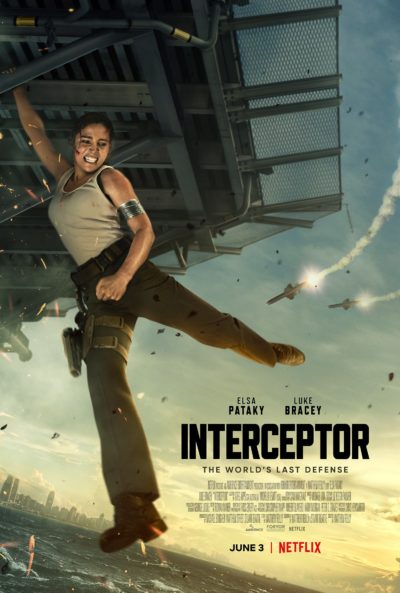 Two minutes in, Chris turned to me and said, “Is this an Asylum movie?” Oh, that she had been right, for the net results might have been more entertaining. This is truly the dumbest film I have seen in a very long time. It feels like a throwback in content to about thirty years ago, except with a script that makes your average Cannon product look like Citizen Kane. It’s set on a missile interceptor station in the middle of the Pacific, to which Captain J. J. Collins (Pataky) has just been assigned again. Barely has she dropped her bags off in her cabin, when word comes that their sister base in Alaska has gone dark, and terrorists have stolen 16 Russian ICBMs. Before you can say “shitty Die Hard knockoff”, trust-fund kid Alexander Kessel (Bracey) shows up, intent on removing America’s last line of defense. It’s up to J.J. and plucky SigInt guy Rahul Shah (Mehta) to prevent them – or the terrorists will have won, literally.
Two minutes in, Chris turned to me and said, “Is this an Asylum movie?” Oh, that she had been right, for the net results might have been more entertaining. This is truly the dumbest film I have seen in a very long time. It feels like a throwback in content to about thirty years ago, except with a script that makes your average Cannon product look like Citizen Kane. It’s set on a missile interceptor station in the middle of the Pacific, to which Captain J. J. Collins (Pataky) has just been assigned again. Barely has she dropped her bags off in her cabin, when word comes that their sister base in Alaska has gone dark, and terrorists have stolen 16 Russian ICBMs. Before you can say “shitty Die Hard knockoff”, trust-fund kid Alexander Kessel (Bracey) shows up, intent on removing America’s last line of defense. It’s up to J.J. and plucky SigInt guy Rahul Shah (Mehta) to prevent them – or the terrorists will have won, literally.  Halfway through the final installment, Chris came in. She paused, watching for a moment, then said, “They spend far too much time talking, and not enough time killing.” Just a shame she waited 93 episodes to express so succinctly one of the main problems with the series. For, even if the final arc had its share of bloodshed, if you average it out per show, it’s about the level of a mid-strength nosebleed. It certainly put the novela into narconovela. Though the problems began at the start – or, rather, the end of the second series where heroine Sara Aguilar was apparently gunned down. This being a show where escape from death was common, I spent the first 20 episodes waiting for her to return. Spoiler: she doesn’t.
Halfway through the final installment, Chris came in. She paused, watching for a moment, then said, “They spend far too much time talking, and not enough time killing.” Just a shame she waited 93 episodes to express so succinctly one of the main problems with the series. For, even if the final arc had its share of bloodshed, if you average it out per show, it’s about the level of a mid-strength nosebleed. It certainly put the novela into narconovela. Though the problems began at the start – or, rather, the end of the second series where heroine Sara Aguilar was apparently gunned down. This being a show where escape from death was common, I spent the first 20 episodes waiting for her to return. Spoiler: she doesn’t.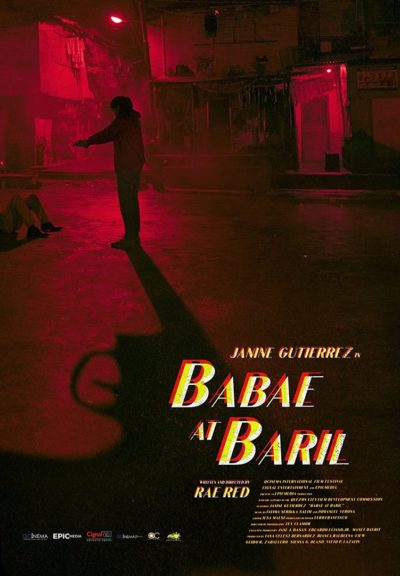
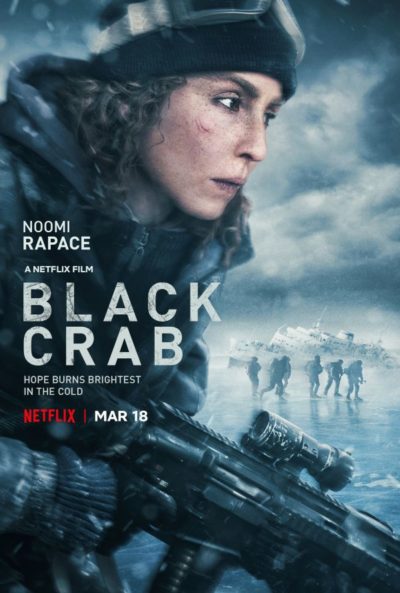 Rapace seems to be turning into a female version of Ryan Reynolds. By which I mean, it seems that hardly a month goes past without a new Netflix Original coming out starring her. Ryan had 6 Underground, Red Notice and The Adam Project. Noomi has given us
Rapace seems to be turning into a female version of Ryan Reynolds. By which I mean, it seems that hardly a month goes past without a new Netflix Original coming out starring her. Ryan had 6 Underground, Red Notice and The Adam Project. Noomi has given us 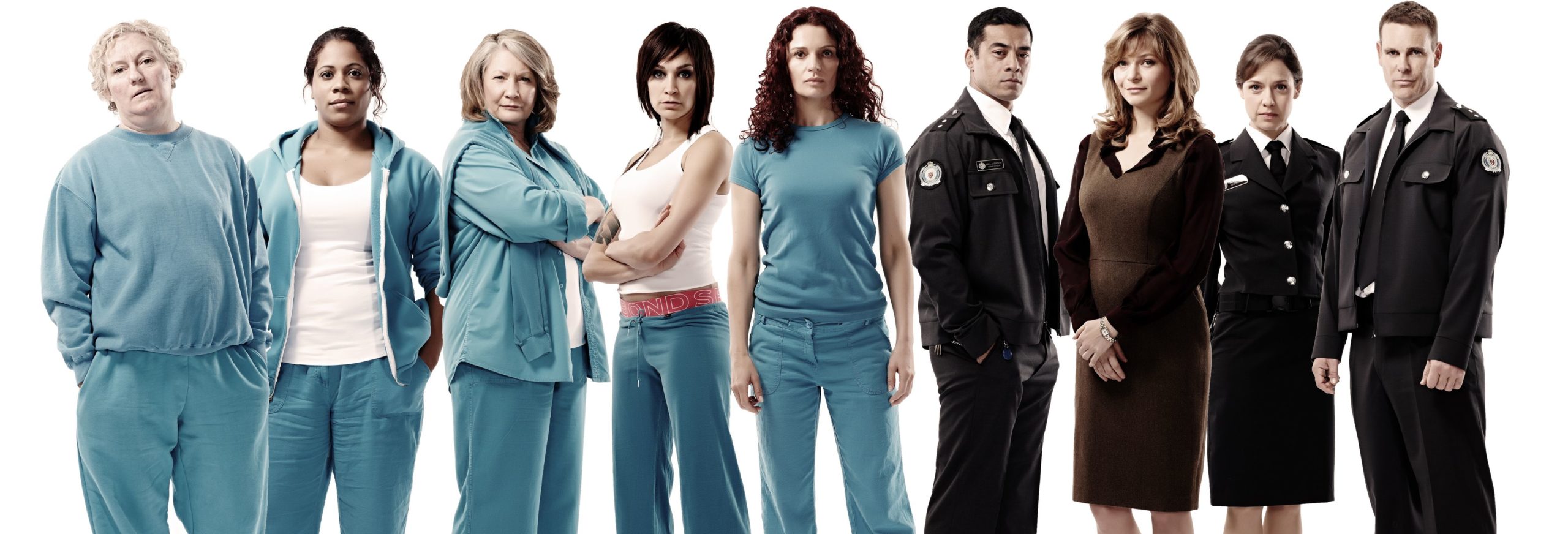 ★★★★
★★★★ Back in the eighties, there was an Australian women-in-prison soap opera called Prisoner Cell Block H. [It was called Prisoner on its home turf, but was renamed in the UK and US, to avoid confusion with The Prisoner] It ran for eight seasons, totalling 692 (!) episodes, and achieved a fair bit of cult status, mostly through late-night screenings on TV. Much of its reputation was based on “so bad it’s good” elements, such as the wobbly sets; a
Back in the eighties, there was an Australian women-in-prison soap opera called Prisoner Cell Block H. [It was called Prisoner on its home turf, but was renamed in the UK and US, to avoid confusion with The Prisoner] It ran for eight seasons, totalling 692 (!) episodes, and achieved a fair bit of cult status, mostly through late-night screenings on TV. Much of its reputation was based on “so bad it’s good” elements, such as the wobbly sets; a 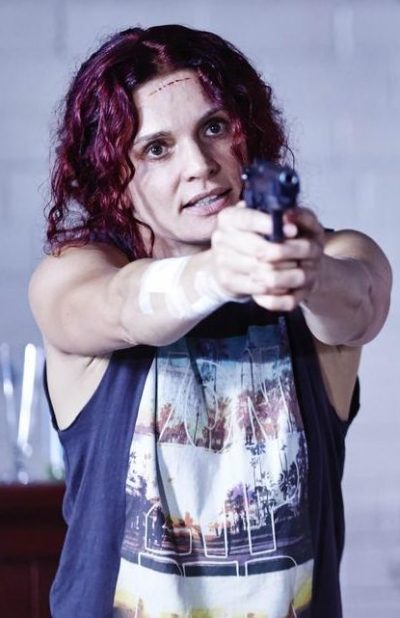 It spawned local remakes in a number of countries. The Dutch was the most successful, running for four seasons, but Belgium, Germany and Turkey also took the show and recreated it. [Here is as good a place as any to mention that back in 1982, there was a male spin-off of the original show called Punishment. Though it lasted only one season, the cast included some guy called Mel Gibson…] Indeed, the Turkish one, known on Netflix as The Yard, was
It spawned local remakes in a number of countries. The Dutch was the most successful, running for four seasons, but Belgium, Germany and Turkey also took the show and recreated it. [Here is as good a place as any to mention that back in 1982, there was a male spin-off of the original show called Punishment. Though it lasted only one season, the cast included some guy called Mel Gibson…] Indeed, the Turkish one, known on Netflix as The Yard, was 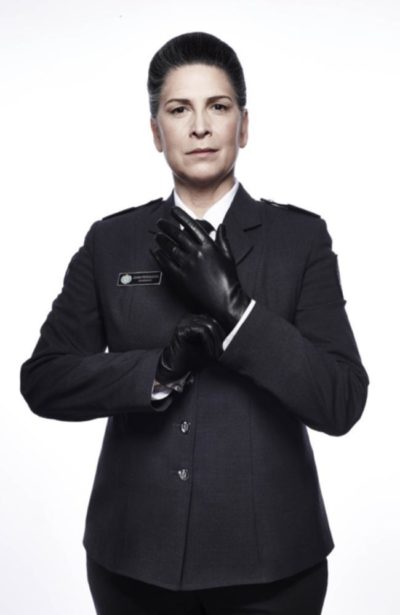 One such was the character mentioned above: Joan Ferguson (Rabe), known as ‘The Freak’ (left). She joined the show as the new governor of Wentworth in season 2, and was, to be blunt, a clinical psychopath, devoid of empathy and incredibly manipulative. She was also very smart, a lethal combination. However, it’s not enough to save her from ending up a prisoner in the jail herself. The first episode of season 5, where Ferguson is released into the general population was, for me, peak Wentworth, and one of the best 45 minutes of television I’ve seen, in any genre.
One such was the character mentioned above: Joan Ferguson (Rabe), known as ‘The Freak’ (left). She joined the show as the new governor of Wentworth in season 2, and was, to be blunt, a clinical psychopath, devoid of empathy and incredibly manipulative. She was also very smart, a lethal combination. However, it’s not enough to save her from ending up a prisoner in the jail herself. The first episode of season 5, where Ferguson is released into the general population was, for me, peak Wentworth, and one of the best 45 minutes of television I’ve seen, in any genre.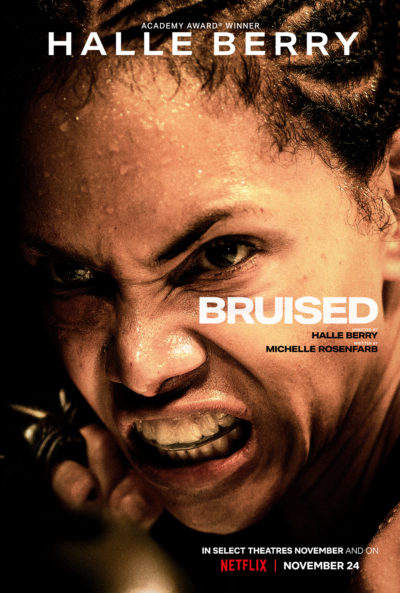 Halle Berry was born the same year I was. There is, however, just one of us that is capable of convincingly playing the role of a mixed martial artist. To give you another yardstick, the lead in this was originally going to go to Mrs. Ryan Reynolds, Blake Lively (
Halle Berry was born the same year I was. There is, however, just one of us that is capable of convincingly playing the role of a mixed martial artist. To give you another yardstick, the lead in this was originally going to go to Mrs. Ryan Reynolds, Blake Lively ( I’ve never played League of Legends, but the good news is, you don’t need to, in order to enjoy Arcane. While that may provide some extra depth, it works perfectly well on its own. There is a degree of over-familiarity with the high-level scenario, which is Generic Fantasy Plot #3. Per Wikipedia’s premise, “Amidst the escalating unrest between the advanced, utopian city of Piltover and the squalid, repressed undercity of Zaun…” Yeah, it’s class war time again, cut from the same basic stamp as
I’ve never played League of Legends, but the good news is, you don’t need to, in order to enjoy Arcane. While that may provide some extra depth, it works perfectly well on its own. There is a degree of over-familiarity with the high-level scenario, which is Generic Fantasy Plot #3. Per Wikipedia’s premise, “Amidst the escalating unrest between the advanced, utopian city of Piltover and the squalid, repressed undercity of Zaun…” Yeah, it’s class war time again, cut from the same basic stamp as 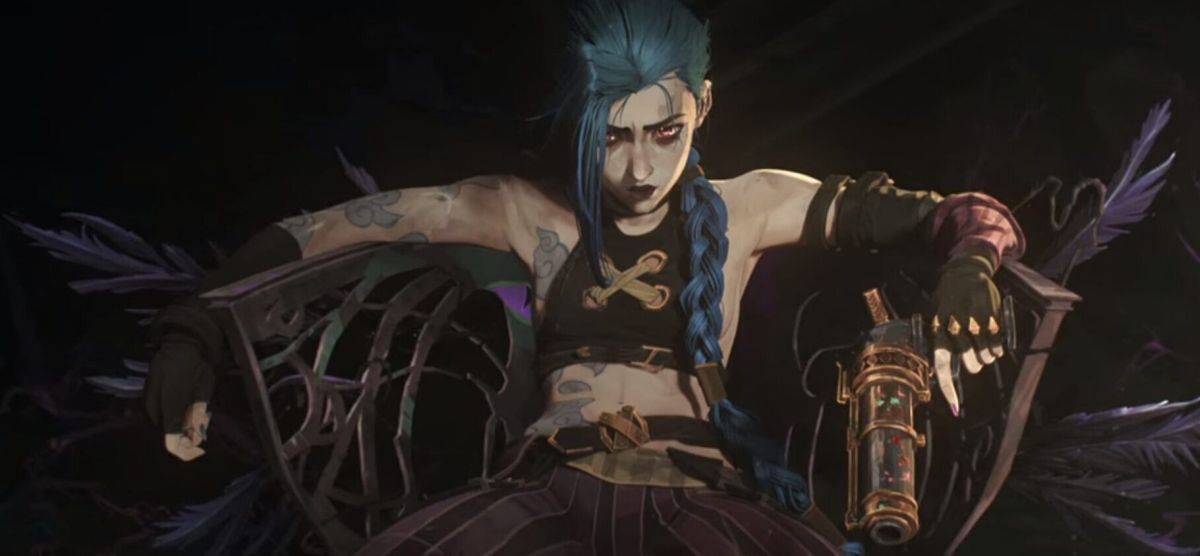
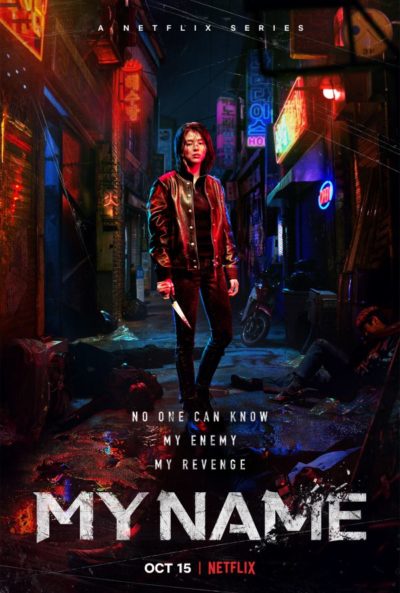
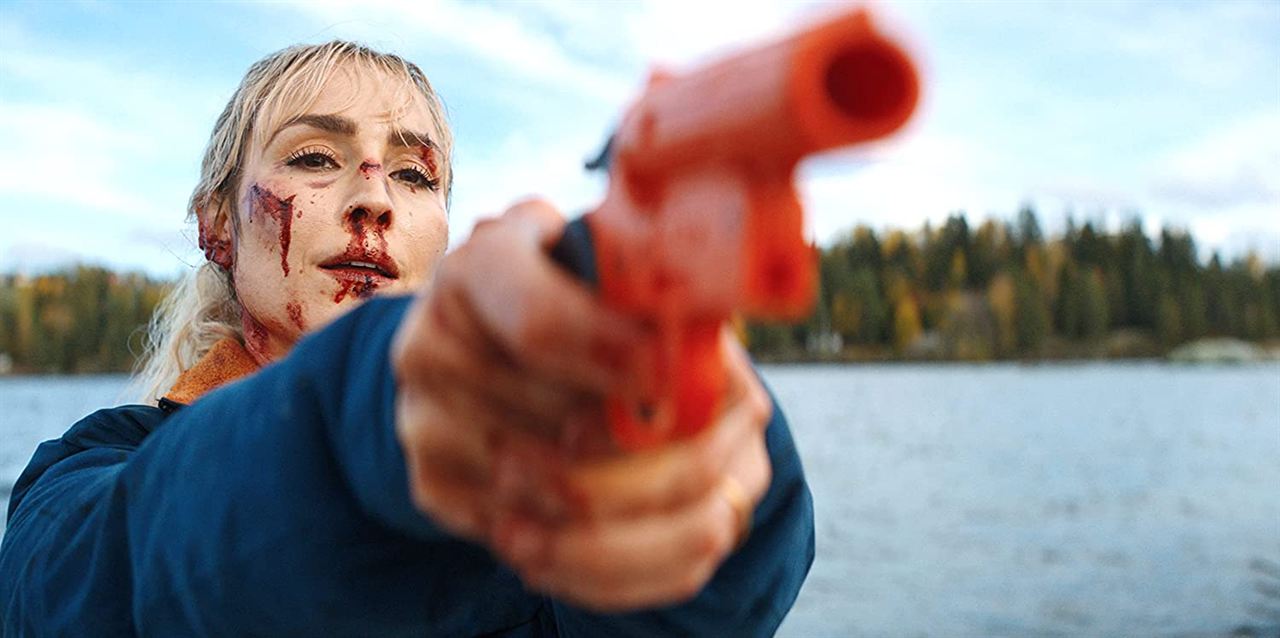 ★★★½
★★★½